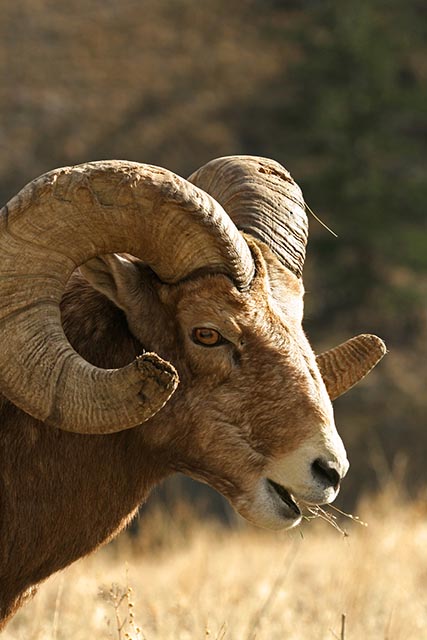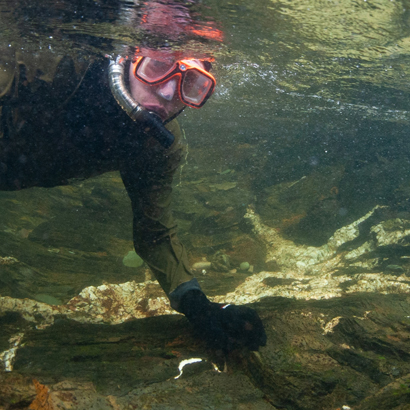PhD Wildlife Biology
 The Doctor of Philosophy requires the demonstration of distinguished scholarship in a dissertation based on original and creative work. This degree is designed to provide an opportunity for students to receive specialized education in fish and wildlife ecology. It involves investigation and analysis of scientific, technical or managerial subjects.
The Doctor of Philosophy requires the demonstration of distinguished scholarship in a dissertation based on original and creative work. This degree is designed to provide an opportunity for students to receive specialized education in fish and wildlife ecology. It involves investigation and analysis of scientific, technical or managerial subjects.
Our program places emphasis on development of the whole scientist. This means operating a student-centric program that includes not only development of analytical, academic, and critical thinking skills, but providing mentorship to develop the social, professional, and technical skills needed to succeed professionally in their chosen career path. Students will develop and communicate their own research to scientific and general audiences and will explore the broader impacts of their research.
How to Apply
We highly recommend that prospective graduate students contact faculty that they are interested in working with before they apply. Faculty information can be found on the faculty page of this site. We receive approximately 100 applications each year and only accept those students for whom we have available funding, usually in the form of a research or teaching assistantship. Exceptions to this are rare. We expect all of our applicants to at least meet the minimum requirements for admission. We have adopted a holistic approach to graduate admissions as part of our efforts to achieve a more diverse cohort of graduate students with varied experience, backgrounds, and expertise.
Application Process
- Be sure to look through the Wildlife Biology professors, contact them, and find a potential faculty advisor that is encouraging you to apply. Not all faculty are accepting students every year.
- Fill out the UM Graduate School application and pay the fee.
- As part of the application you will be asked to provide the following:
- Please describe your motivations for obtaining this graduate degree and highlight some of your professional goals. (300 word limit)
- What accomplishment makes you most proud? For example, you could discuss a challenge that you overcame and/or an initiative that you have led? (300 word limit)
- Please provide a statement that illustrates your capacity to learn new skills, adaptability, willingness to challenge yourself, your passion, and/or where you have been key in bringing a project to completion? (300 word limit)
- A detailed resume or Curriculum Vitae.
- E-mail addresses for three (3) references who have agreed to provide letters of recommendation. Some references should be able to speak about the applicant's academic performance.
- Unofficial transcripts
- If English is not your first language, an official English Assessment (TOEFL, IELTS, or MET) is required
The GRE will no longer be required as part of our application materials.
NOTE: No special application form is required for financial assistance. Awarding of financial assistance is a separate process from admission.
Application Deadline
All students must submit application materials to the UM Graduate School BY JANUARY 1st, unless the professor is recruiting for a position funded through a Research Assistantship and has communicated a different deadline.
Admission Requirements
Most applicants to the Ph.D. program have completed or are completing masters degrees. Students without Master of Science degrees will be considered if these applications demonstrate strong potential to complete a Ph.D. program. All successful applicants generally have at least one degree in Wildlife Biology or a closely related field; students with other backgrounds may be accepted depending on an appropriate level of ecological expertise and an advisor willing to supervise the student.
Preliminary decisions regarding acceptance into the Ph.D. program will be made using the following criteria:
- Submission of all materials listed above. Graduate admissions rankings will be based on GPA, demonstrated ability to learn necessary skills, achievements in research, outreach, education, and community activities, strong motivations for the degree, demonstrations of leadership, adaptability, accomplishments, as well as letters of recommendation.
- Minimum grade point average (GPA) of 3.0 in undergraduate work and 3.5 in graduate work.
- For applicants whose native language is not English, the applicant must have a minimum TOEFL score of 80, an IELTS score of 6.5, or MET of 58.
A key criterion for accepting an applicant is the willingness of a faculty member to serve as advisor. Under no conditions are applicants accepted without the agreement of a faculty member who will serve as the major professor.
The Graduate Admissions Committee will determine acceptability of applicants based on the above criteria (exceptions to these minimums must be approved by a vote of the WBIO faculty) within 6 to 8 weeks of the application deadline. Faculty who want to accept a Ph.D. student may select from the entire pool of applicants deemed “acceptable” by the Graduate Admissions Committee. Students must enroll in the semester stated in their acceptance letter or in the subsequent semester. Unless prior arrangements have been made, students not initiating degree work within this time period must reapply for admission.
All current students must be familiar with the requirements and procedures established by the UM Graduate School for their particular degree. Additional specific programmatic requirements and deadlines regarding course requirements, dissertation proposal defense, comprehensive exams, and the dissertation defense for the Fish and Wildlife Biology Program are described in the Policies and Procedures document under the information for current students webpage.
The emphasis in a Ph.D. program is on the student’s professional development, stimulation of intellectual curiosity, and familiarity with science, and not on a specified set of courses. However, certain coursework requirements must be successfully completed: The Ph.D. student must obtain a minimum of 60 graduate semester credits beyond the bachelor’s degree. A dissertation committee may require more depending on the student’s background for the proposed research program. Of the 60 graduate semester credits, no more than 20 of these credits may be thesis credits. Students may request to apply up to 20 credits of previous graduate coursework toward the requirement of 60 credits.
Financial Aid
Research Assistantships
Research assistantships are made available to graduate students by faculty members who have received grants from outside sources (for example, Forest Service, Park Service, Fish and Wildlife Service, National Science Foundation, other public and private organizations). The number of research assistantships offered varies by year depending on available funds. Research assistants are assigned duties by the faculty member with funding; these duties are often the student's own research project. Research assistants are required to register for 6 credits each semester.
Teaching Assistantships
The Wildlife Biology Program has a number of teaching assistantships available each year. Graduate students in these positions assist faculty with course instruction through leading labs or discussion sections, delivering lectures and grading assignments. Teaching assistants are selected according to their background in courses for which teaching assistants are needed on a semester or yearly basis. Full-time teaching assistants work approximately 20 hours per week for 15 weeks each semester of the academic year. In addition to their salaries, teaching assistants receive a tuition fee waiver (in-state or out-of-state) and a waiver of the registration fee. Other fees charged by the University are not included in the TA fee waiver package. Both incoming and current graduate students are considered for teaching assistantships. Teaching assistants are required to register for 6 credits each semester.
UM Tuition and Funding Information
If you have any questions or if we can help you in any way, please contact our office for information: 406-243-5292 or by email at request@cfc.umt.edu.
Additional Information for International Prospective Students:
Applying for International Admission to the UM Graduate School
